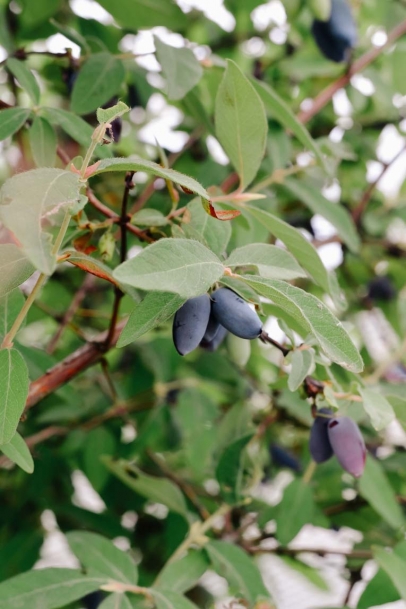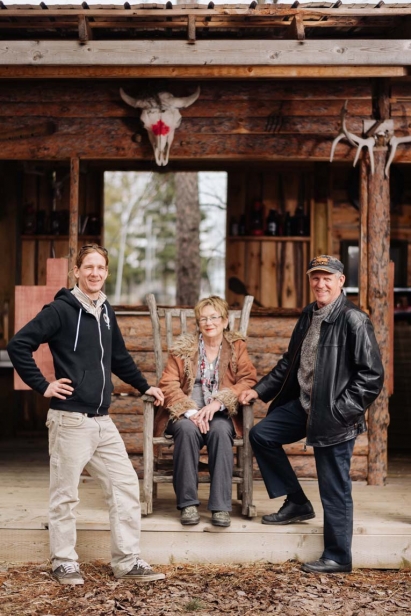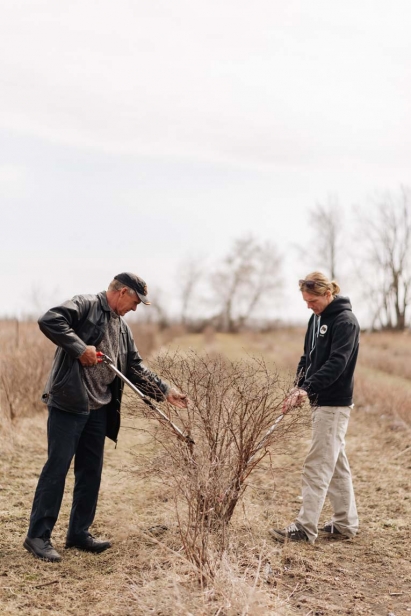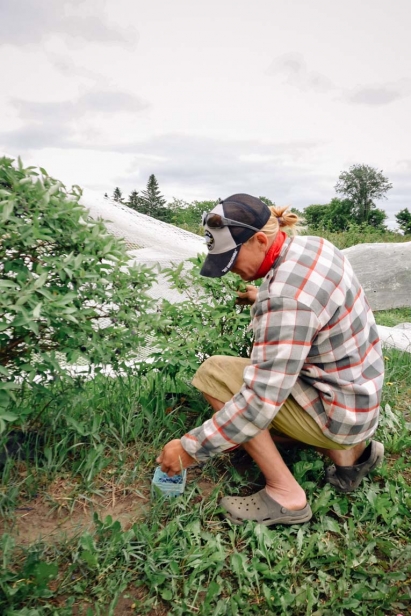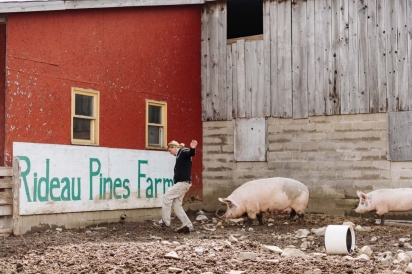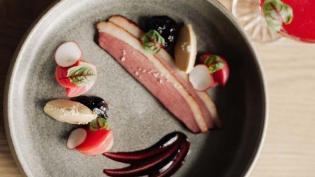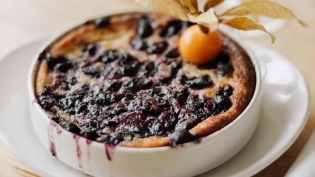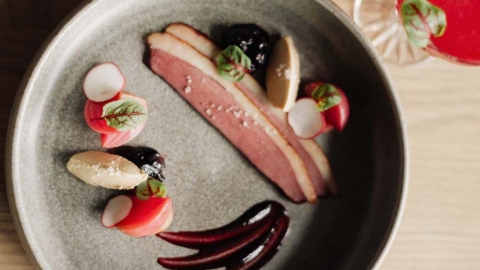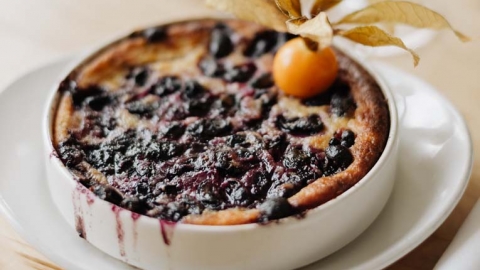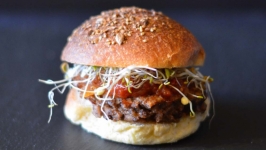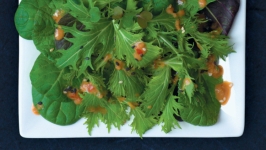A Family Affair - Rideau Pines Farm
Rideau Pines Farm is a small 25-acre operation that produces berries, vegetables and herbs on a little farming paradise 20 minutes from Ottawa down the Fourth Line Road. Small it may be, but its effect on the Ottawa food scene is immense. The finest restaurateurs in the city rely on Rideau Pines for their berries, herbs and vegetables. Families visit the farm so that children can pick their own fruit and regain a sense of where all that sweet stuff on their plates comes from. Immigrants from Eastern Europe rely on Rideau Pines for produce to recreate the culinary delights from back home. The farm hosts weddings and picnics and this year, it will serve as the venue for one of Ottawa’s best summer music festivals.
That’s a long way from the farm’s modest beginnings back in 1980, when John Vandenberg, an agronomist of long experience, bought an abandoned 50-acre dairy farm. Over the years, he reclaimed half of that land, clearing it, adding a pond and beginning the crop cultivation that today makes Rideau Pines one of the area’s top producers.
“It was hard work, clearing that land,” John remembers today. “But it’s been a great life and has become a true family affair.”
With his wife Saundra, John has delighted in training their sons, Matt and Paul, in all aspects of the farm’s operation. Matt’s role is particularly prominent. Eight years ago, he began building business relationships with the best chefs in the city. A list, necessarily incomplete because of its length, would include all of Stephen Beckta’s restaurants, The Cheshire Cat Pub, The Piggy Market, The Wellington Gastropub, Allium, Absinthe, the Whalesbone restaurants, The Belmont, The Pomeroy House, Two Six Ate, and even the Bridgehead coffee shops. “With restaurants, the bottom line is the quality of your produce and thanks to that — and to Matt, who’s built a lot of great relationships — we’ve got all of them,” Saundra says. “They design their menus around what we produce.”
Home cooks can pick their own Rideau Pines produce at the farm, they can also purchase what they need at the farm’s own store, or they can buy it at the farm’s stalls at the North Gower, Beechwood, and Kemptville farmers’ markets.
Thirty per cent of the farm’s revenues come from the pick-your own operation, 30 per cent from retail sales, and 40 per cent from restaurant sales, according to John.
The founder, now in his early 70s, as is Saundra, has had farm life in his blood from birth. He grew up on a farm that raised vegetables, fruit and flowers. From that beginning, practical farming and agronomy, the scientific study of farming methods, became his life.
By 25, he had earned bachelor’s and master’s degrees in agriculture at the University of Guelph, where he was also captain of the varsity football team. That prepared him for decades of service in various agricultural associations, a five-year stint four decades ago as head of horticulture at the University of Guelph’s College of Agricultural Technology in Kemptville, and service in government helping farmers across Canada and in a number of foreign nations improve their farming practices.
This is a man whose resumé, if dropped, would shake a tectonic plate or two.
After retirement from academic and government work, he volunteered with the Canadian Executive Service Organization, commonly known as CESO. As a CESO consultant, he helped Latvian farmers improve their cultivation and marketing of cranberries and blueberries, later doing the same thing for farmers of other crops in Slovakia, Moldova, Serbia, Ukraine and Thailand.
His eye for new crops has led him eight years ago to introduce the haskap, sometimes called the blue honeysuckle, to the soil of Rideau Pines Farm. “It’s delicious,” he says. “Think of a cross between the raspberry and the blueberry — a little bit of zing that will tickle your taste buds.”
There are a number of varieties of haskap, many of them developed in the fruit program at the University of Saskatchewan.
For a farmer, haskap has a few disadvantages. The window of harvest is narrow. Predation by berry-loving birds can reduce the farm’s take. And the berries easily fall to the ground, where they can spoil.
“They’re hard work, but they make a wonderful early crop — and restaurants just seem to love them,” John says.
Jo-Ann Laverty, owner of Cake Lab, describes the haskap as “a wonderful-tasting berry that is both sweet and tart at the same time.” Laverty, who produces sourdough cakes for sale at farmers markets, finds haskap makes “a wonderful, antioxidant-rich juice” and, as a primary element in compotes, pairs beautifully with such meats as duck and with any savoury dish.
The farm’s pick-your-own operation attracts people who want the freshest produce — among them, quite a number of immigrants from eastern Europe to whom freshness and lack of processing are watchwords. Among Russians, the farm’s black currants are favourites. Bosnians encouraged the Vandenbergs to start growing paprika. “They have a passion for this pepper,” Saundra says. “They come out in droves and pick bushels of them.” And most of the east European immigrant community seems to love gooseberries.
The farm has its own store that sells not only produce, but locally produced honey and maple syrup.
The farm also has areas well suited to picnics and even the occasional wedding, as well as a saloon that boasts a stage, perfect for musical performances.
John may have built the farm, but Saundra is emphatic that she keeps the operation running smoothly. “I’m the CEO, the knowledge coordinator, the mum, you see. I’ve been running things for nearly 40 years.”
One of Saundra’s delights is seeing young urban families step out of their cars and into a life that was more accessible in their grandparents’ time. “The young kids are like, ‘wow!’ They can run wild, they can eat fresh-picked fruit — and they can learn all the sorts of natural things that children in the city have no exposure to. Seeing that makes life special.”
HASKAP
The haskap, technically known as Lonicera caerulea, is still largely unknown, but looks set to become one of the great new superfoods.
Sometimes called the blue honeysuckle or honeyberry, the haskap, which looks like an elongated blueberry, this cool-climate berry is found in the northern boreal forests of Asia, Europe and North America. In Canada, it’s found wild in every province except British Columbia.
The name haskap was given by the Ainu people in Japan and means “berry of long life and good vision.” It is loaded with Vitamins A and C and has very high fibre and potassium content — but its most important trait for the health conscious is its high concentration of anthocyanins, a kind of flavonoid also found in black raspberries, purple grapes and aronia berries. Flavonoids have many positive effects on health. They help combat heart disease and cancer, may help with such chronic conditions as osteoporosis and diabetes and may potentially reduce the eye problems that come with aging.
In 2009, a group of Slovak researchers compared anthocyanin content of six berries and found that the haskap had by far the highest level.
Best of all, the haskap is one medicinal food that is no problem to get down. It tastes like a blueberry, but with more tang. Some people have described it as combining the flavours of blueberry, raspberry and black currant.
Some of its wild varieties have not had much palate appeal, but agronomists are constantly improving the taste to the point that haskap is now a favourite springtime berry of many Ottawa restaurateurs.
In Ottawa, Matt Vandenberg is perhaps the public face of Rideau Pines. For nearly a decade, he has been on the restaurant loop, making friends with chefs around the city and taking pains to deliver to them exactly the produce they want, with everything beautiful and fresh.
An article in the U.K.’s Guardian newspaper noted that Matt “looks more like a surfer or a rock star than a farmer” and compared him to “a green-fingered Robert Plant, walking around his farm playing air guitar and issuing the odd ‘right on’ as he tends to his audience of produce.”
“They bring the very best, all exceptional produce,” says Pomeroy House chef and co-owner Rich Wilson. “And they’re great people. They’ll call and talk to you and never once seem to want off the phone.”
Chris Wylie, chef de cuisine at Gezellig Dining, one of the Beckta restaurants, says he sources 60 per cent of his summertime produce from Rideau Farms. “Why is it good? Because it’s farm fresh, presented well with everything properly trimmed — and the price vs. quality ratio is as good as you get.”
But Wylie is as impressed with the Vandenbergs personally as he is with their produce. “They’re just lovely to talk to and make everyone feel at home.”
Wylie remembers taking his then four-year-old son Jack out to the farm some years back.
“New situation for Jack, of course, and I should point out that he’s not much of a fruit eater — but he was instantly comfortable with Matt, who picked up a machete and sliced up a watermelon.
“I’ve never seen Jack eat fruit like that.”
John says he’s slowing down a bit, but Saundra will have nothing of it. “Retirement is the first step in dying and I’m not going to retire. I’m here till I die,” she says.
Barely 40 and looking at longer horizons, Matt is equally sure that the farm will be a constant in his future.
“How many people get to say they’re working on the land they grew up on?” Matt asks. “How many people get to experience the rhythm of life the way a farmer does?”
He says he’ll be on Rideau Pines for the rest of his life. “We love the soil, we love growing things, we love our relationships with our customers, we love knowing we’re doing something really well. And why would anyone want to change that?”
Rideau Pines Farm
5714 Fourth Line Rd., North Gower, Ont.
rideaupinesfarm.com, 613.489.3601
ARBORETUM FESTIVAL
This August, Rideau Pines Farm will host the Arboretum Festival, one of Ottawa’s best summer celebrations of music.
As festival founder Rolf Klausener says, “Rideau Pines is exactly the kind of venue we’ve been looking for since we began six years ago.”
Klausener always wanted to emulate various music festivals in Europe, which tend to be intimate affairs, often set in forests, in which attendees draw as much inspiration from nature as they do from the music. “At Rideau Farms, we will be in the midst of a magical forest, with secret paths, amazing local foods, lots of room for camping and a tent for all-night cinema. This will be far better than the 14 venues we had last year across the city of Ottawa.”
Getting there will be no problem, Klausener says. There will be a shuttle bus that will bring ticket holders from Ottawa all day long. (He adds that those who drive will find lots of parking.)
The Arboretum Festival will run from August 18th to the 20th. For more information, see arboretumfestival.com, the festival website.


